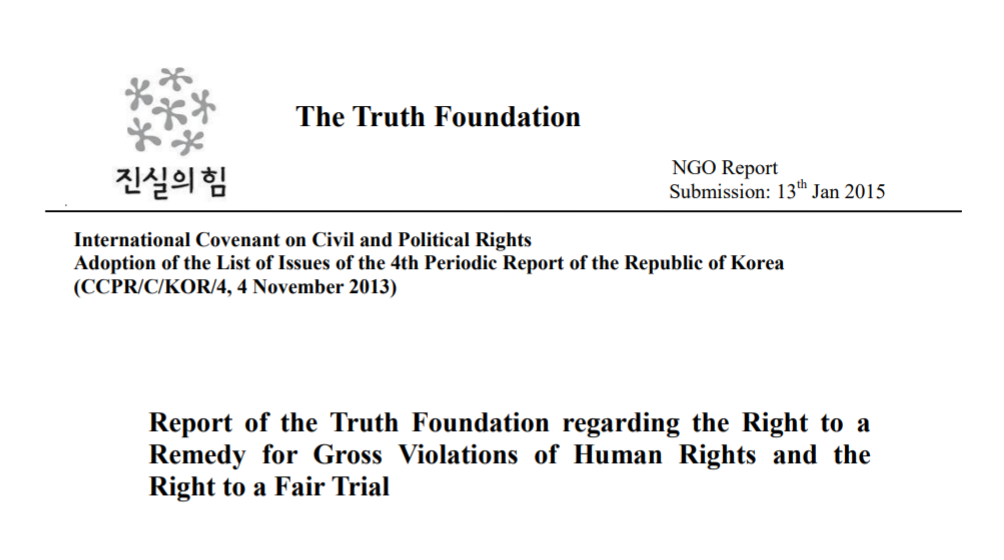올해 10월 22일부터 23일 유엔 자유권규약위원회는 대한민국 정부가 제출한 제4차 국가보고서에 대한 심의를 진행했습니다. 본 심의 이전에 대한민국 정부는 자유권규약위원회가 작성한 쟁점목록(List of Issues)에 대답해야할 의무가 있습니다. 유엔은 모든 활동에서, 특히 인권과 관련된 활동에서 해당 분야의 전문성을 갖고있는 NGO의 적극적인 참여를 환영합니다. 진실의힘은 올해 1월 제4차 한국정부보고서 심의를 위한 shadow report로, 대한민국의 사법부가 공정한 재판의 원칙을 지키지 않고 있고, 법의 지배 원칙을 훼손하였으며, 그 결과 중대한 인권침해의 피해자들의 권리가 제한, 박탈당하고 있음을 지적하는 내용의 보고서를 제출하였습니다. 중대한 인권침해 피해자들이 국가를 상대로 손해배상을 청구할 때, 민법상 3년으로 통용되어 온 소멸시효를 대법원이 지난 2013년 12월 12일 느닷없이 6개월로 한정함으로써, 그 이후 대법원 판결을 받은 분들의 경우, 손해배상권을 박탈당하고 만 것에 대한 문제제기 입니다.
본 보고서에서 재단법인 진실의힘이 유엔 자유권규약위원회를 통해 대한민국 정부에 질문한 사항을 아래에 첨부합니다. 보고서 전문은 아래 링크를 클릭하시면 읽으실 수 있습니다.
CCPR_Report of the Truth Foundation_Final.pdf
(1) The Korean Civil Code provides that the statute of limitations starts to run when the right at issue can be exercised and, in the case of gross human rights violations committed by the state, the victims could not exercise their right to reparation because of continued state oppression and concealment of the truth or because of wrongful convictions handed down by the courts. Yet, is it true that the Korean Supreme Court has ruled that the victims’ right to reparation expired because the statute of limitations has run? If the statute of limitations only starts to run when a right can be exercised, then what is the logical basis for ruling that it has run during the period in which victims could not exercise their rights?
(2) Is it true that the circumstance of not being able to file a civil suit for compensation because a prior guilty verdict was delivered in a fabricated North Korean spying case in which the victim was tortured, was interpreted by the Korean Supreme Court as being an “factual impediment,” and not a “legal impediment”? What is the logical basis for this interpretation when a guilty verdict delivered by a court is a legal judgment, of which the legal effect is criminal punishment?
(3) Is it true that until May 16, 2013 the Korean Supreme Court barred the state from pleading the statute of limitations defense, and thereby interpreting that the victims of gross human rights violations could obtain a remedy if a civil suit is filed within 3 years from the date the TRC uncovered the truth or from the date victims received a not guilty verdict in a retrial? What is the reason for the Supreme Court reducing this period to 6 months in their rulings of May 16, 2013 and December 12, 2013? What is the logical or policy basis for this change in the direction of restricting the right to a remedy for victims of gross human rights violations?
(4) Do the recent rulings of the Korean Supreme Court regarding the right to a remedy for victims of gross human rights violations conform to the principles of Paragraph 6 and Paragraph 7 of the UN Reparation Principles? How does the Korean Supreme Court interpret the UN Reparation Principles and ICCPR Article 2 regarding the right to a remedy for victims of gross human rights violations?
(5) Having approved the adoption of the UN Reparation Principles, how does the Korean government apply these principles with respect to the right to a remedy for victims of gross human rights violations? In civil suits brought before the courts by victims of gross human rights violations what position has the government taken on the statute of limitations? Has the Korean government advised the court that the Korean government approved the adoption of the UN Reparation Principles and that these principles must be considered in interpreting the law? If not, what is the reason for not doing so?
(6) The TRC was established by the Korean government pursuant to a special law and it went on to uncover many past instances of gross human rights violations. In light of this, what is the basis for the Supreme Court’s discriminatory interpretation that only victims who petitioned the TRC are entitled to compensation while victims who did not submit a petition are not entitled?
(7) In the case of the victim Jung Young and his family who were all illegally detained and tortured, they all filed their civil suit within 3 years from the date the TRC issued its findings. Yet, while his family was granted compensation, Jung Young was denied solely for not filing within 6 months from the date of the decision on the penal compensation claim, even though Jung Young additionally suffered 15 years of imprisonment and also had to undergo a retrial and a penal compensation claim process. What logical or policy basis can justify such a discriminatory outcome?
(8) In the cases of Kim Yang-ki and Lee Jun-ho, who suffered the same gross human rights violations and who filed civil suits for compensation at similar times following similar procedures, one (Kim Yang-ki) was granted compensation and the other (Lee Jun-ho) was denied depending on the happenstance of which Supreme Court panel each was assigned. What is the principle under Korean law that justifies this result? In order to avoid such an inequitable outcome in Lee Jun-ho’s case, why did the Supreme Court, in changing its interpretation, apply such new interpretation retrospectively and not just prospectively?
